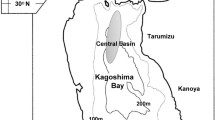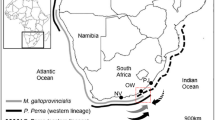Abstract
Aspects of the recruitment of hake (Merluccius merluccius L., 1758) and greater fork beard (Phycis blennoides Brunnich, 1768) in the Strait of Sicily (Central Mediterranean) are presented. Data were collected from 1994 to 1999 during the international bottom trawl survey program MEDITS. In view of the available literature on juvenile growth of these two species in the Mediterranean area, a length-based criterion was adopted to separate fish belonging to the 0 group (recruits). Recruit density indices (R/km2) by haul were calculated based upon the likely variability of recruit growth among years and used to study abundance variability and spatial pattern of recruitment and to identify the main nursery areas. Although there was inter-annual variability, two stable areas for M. merluccius were identified on the eastern side of the Adventure Bank and the Malta Bank at depths ranging between 100 and 200 m. The main nursery areas for P. blennoides were deeper (from 200 to 400 m) and two stable nursery areas were identified on the western and eastern side of the Adventure Bank; other nurseries were found in the easternmost part of the Strait in 1998 and 1999. Recruitments of the two species were significantly correlated, with the strongest recruitment occurring in 1998 and 1999 for each species.
Similar content being viewed by others
References
Abella, A., J. F. Caddy & F. Serena, 1997. Do natural mortality and availability decline with age? An alternative yield paradigm for juvenile fisheries, illustrated by the Hake Merluccius merluccius fishery in the Mediterranean. Aquat. Living Res. 10: 257–269.
Alvarez, P., L. Motos, A. Uriarte & J. Egana, 2001. Spatial and temporal distribution of European hake, Merluccius merluccius (L.), eggs and larvae in relation to hydrographical conditions of the Bay of Biscay. Fish. Res. 50: 111–128.
Ardizzone, G. D. & F. Corsi (eds), 1997. Atlas of Italian Demersal Fishery Resources. Trawl Survey 1985-1987. Biol. Mar. Medit. 4: 568 pp.
Ardizzone, G. D., F. Corsi & S. Agnesi (eds), 1999. Atlante delle Risorse Ittiche Demersali Italiane Triennio 1994-1996. Ministero per le Politiche Agricole. Roma
Bailey, M. K., 1981. Larval transport and recruitment of Pacific Hake Merluccius productus. Mar. Ecol. Prog. Ser. 6: 1–9.
Babcock Hollowed, A. & M. K. Bailey, 1989. New perspectives on the relationship between recruitment of Pacific Hake Merluccius productus and the ocean environment. Can. Spec. Publ. Fish. aquat. Sci. 108: 207–220.
Bertrand, J. A., L. Gil de Sola, C. Papaconstantinou, G. Relini & A. Souplet, 2002. The general specifications of the MEDITS surveys. Sci. mar. 66 (Suppl. 2): 9–17.
Belcari, P. & F. Biagi, 1999. Phycis blennoides. In Relini G., J. A. Bertrand & A. Zamboni (eds), Synthesis of Knowledge on Bottom Fishery Resources in Central Mediterranean (Italy and Corsica). Biol. Mar. Medit. 6: 189–196.
Boulhal, M., 1973. Le merlu de côtes nord de la Tunisie: Etude économique et biologique (reproduction, sex ratio et répartition bathymétrique). Bull. Inst. Océanogr. Pêche Salammbò 2: 579- 603.
Caddy, J. F., 1991. Death rates and time intervals: is there an alternative to the constant natural mortality axiom? Rev. Fish Biol. Fish. 1: 109–138.
Caddy, J. F., 1993. Some future perspectives for assessment and management of Mediterranean Fisheries. Sci. mar. 57: 121–130.
Campana, S. E., 1996. Year class strength and growth rate in young Atlantic cod Gadus morhua. Mar. Ecol. Prog. Ser. 135: 21–26.
Casey, J. & J. Pereiro, 1995. European hake (M. merluccius) in the North-east Atlantic. In Alheit, J. & T. J. Pitcher (eds), Hake, Fisheries, Ecology and Markets. Chapman & Hall, London. Fish & Fisheries Ser. 15: 125–147.
Colloca, F., 1999. Merluccius merluccius. In Relini, G., J. A. Bertrand & A. Zamboni (eds), Synthesis of Knowledge on Bottom Fishery Resources in Central Mediterranean (Italy and Corsica). Biol. mar. Medit. 6: 259–270.
Cushing, D. H., 1975. Marine Ecology and Fisheries. University Press, Cambridge: 278 pp.
D'Ancona, U., 1933. Uova, larve e stadi giovanili di Teleostei. Fauna e Flora del Golfo di Napoli 38: 232–238.
D'Ancona, U., 1956. Gadidae: uova, larve e stadi giovanili dei teleostei. Pubbl. Stn. Zool. Napoli 38: 19–31.
Farruggio, H. & C. Papaconstantinou, 1998. The status of fisheries resources of the Mediterranean. In Gaps in Mediterranean Fishery Science. CIESM Workshop Ser. 5: 13–24.
Fiorentini, L., J. F. Caddy & J. I. De Leiva, 1997. Long and short trends of Mediterranean fishery resources. FAO GFCM Stud. Rev. 69: 72 pp.
Fiorentini, L., G. Cosimi, A. Sala, I. Leonori & V. Palumbo, 1999. Efficiency of the bottom trawl used for Mediterranean international trawl survey (MEDITS). Aquat. Living Resour. 12: 187–205.
Fiorentino, F., S. Gangitano, S. Ragonese, P. Rizzo & D. Levi, 2000. How the Mediterranean hake grow? Does the available von Bertalanffy parameters describe growth of Merluccius merluccius adequately? Working Group on Demersals of Sub-Committee on Stock Assessment of the SAC of GFCM. Sète, France, 21- 23 March, 2000: ED/P/FF-SG-SR-PR-DL/2/0300/REL: 18 pp (mimeo).
Fogarty, M. J. (ed.), 2000. Recruitment Dynamics of Exploited Marine Populations: Physical-Biological Interactions. Part 1. ICES J. mar. Sci. 57: 189–464.
Gayanilo, F. C. Jr., P. Sparre & D. Pauly, 1996. FAO-ICLARM Stock Assessment Tools (FISAT) User's Manual. FAO-Computerized Information Series - Fisheries: 126 pp.
García Lafuente, J., A. García, S. Mazzola, L. Quintanilla, J. Delgado, A. Cuttitta & B. Patti, 2002. Hydrographic phenomena influencing early life stages of the Sicilian Channel anchovy. Fish. Oceanogr. 11: 31–44.
Harden-Jones, F. R., 1968. Fish Migration. Edward Arnold, London: 325 pp.
Jennings, S., M. J. Kaiser & J. D. Reynolds, 2001. Marine Fisheries Ecology. Backwell Science, Oxford: 417 pp.
Karlovac, J., 1965. Contribution a la connaissance de l'écologie du merlu, Merluccius merluccius L., dans le stade planctonique de sa vie in Adriatique. Rapp. P.V. Reun. CIESM 18: 461–464.
Lembo, G., T. Silecchia, P. Carbonara & M. T. Spedicato, 2000. Nursery areas of Merluccius merluccius in the Italian Seas and in the east side of the Adriatic Sea. Biol. mar Medit. 7: 98–116.
Levi D., M. G. Andreoli, A. Bonanno, F. Fiorentino, G. Garofalo, S. Mazzola, G. Norrito, B. Patti, G. Pernice, S. Ragonese, G. B. Giusto & P. Rizzo, 2003. Embedding sea surface temperature anomalies in the stock recruitment relationship of red mullet (Mullus barbatus L. 1758) in the Strait of Sicily. Sci. mar. 67 (Suppl. 1): 259–268.
Maynou, F., J. Lleonart & J. E. Cartes, 2003. Seasonal and spatial variability of hake (Merluccius merluccius L.) in the NW Mediterranean. Fish. Res. 60: 65–78.
Massutí, E., B. Morales-Nin & D. Lloris, 1996. Bathymetric distribution and recruitment patterns of Phycis blennoides (Pisces:Gadidae) from the slope of the north-western Mediterranean. Sci. mar. 60: 481–488.
Morales-Nin, B. & Y. Aldebert, 1997. Growth of juvenile Merluccius merluccius in the Gulf of the Lions (NW Mediterranean) based on otolith microstructure and length-frequency analysis. Fish. Res. 30: 77–85.
Oliver, P. & E. Massutí, 1995. Biology and fisheries of western Mediterranean hake (M. merluccius). In Alheit, J. & T. J. Pitcher (eds), Hake, Fisheries, Ecology and Markets. Chapman & Hall, London. Fish & Fisheries Ser. 15: 181–201.
Onken, R. & J. Sellschopp, 1998. Seasonal Variability of Flow Instabilities in the Strait of Sicily. J. Geophys. Res. (C Oceans) 103: 24799–24820.
Orsi Relini, L., F. Fiorentino & M. Cappanera, 1988. Mapping the nurseries of Merluccius merluccius in the Ligurian Sea. Rapp. Comm. int. Mer. Médit. 31: 275.
Orsi Relini, L., F. Fiorentino & A. Zamboni, 1989a. Nurseries del Nasello Mediterraneo: dove, quando, perche'. Nova Thalassia 10 (Suppl. 1): 407–416.
Orsi Relini, L., M. Cappanera & F. Fiorentino, 1989b. Spatial-temporal distribution and growth of Merluccius merluccius recruits in the Ligurain Sea. Observations on the 0 group. Cybium 13: 263–270.
Orsi Relini, L., F. Fiorentino & A. Zamboni, 1992. Growth of the Mediterranean hake. Experiences gained in the Ligurian Sea. In Colombo G., I. Ferrari, V. U. Ceccherelli & R. Rossi (eds), Proceedings of the 25th European Marine Biology Symposium, Ferrara, 1990. Olsen and Olsen, Fredensborg: 307–315.
Orsi Relini, L., A. Zamboni, F. Fiorentino & G. Relini, 1997. Vulnerabilità luce-dipendente del nasello (Merluccius merluccius) giovanile. Biol. mar. Medit. 4: 256–262.
Orsi Relini, L, C. Papaconstantinou, S. Jukic-Peladic, A. Souplet, L. Gil de Sola, C. Piccinetti, S. Kavadas & M. Rossi, 2002. Distribution of the Mediterranean hake populations (Merluccius merluccius smiridus Rafinesque, 1810) based on six years monitoring by trawl surveys: some implications for management. Sci. mar. 66 (Suppl. 2): 21–38.
Ottersen, G. & H. Loeng, 2000. Co-variability in early growth and year-class strength of Barents Sea cod, haddock, and herring: the environmental link. ICES J. mar. Sci. 57: 339–348.
Papaconstantinou, C., G. Petrakis & A. Fourtouni, 1992. A preliminary study on the fishery biology of hake in the Aegean Sea. FAO Fish. Rep. 477: 139–149.
Papaconstantinou, C. & K. I. Stergiou, 1995. Biology and fisheries of eastern Mediterranean hake (M. merluccius). In Alheit, J. & T. J. Pitcher (eds), Hake, Fisheries, Ecology and Markets. Chapman & Hall, London. Fish & Fisheries Ser. 15: 140–180.
Petigas, P. & J. Ch. Poulard, 1989. Applying stationary geostatistics to fisheries: a study on hake of the Gulf of Biscay. ICES Doc. 1989/G:62: 21 pp (mimeo).
Ragonese, S., F. Fiorentino, P. Rinelli & S. Greco, 2002. A procedure to evaluate the effect of lag time in studying length structure and growth rate of young fish. The case of Phycis blennoides, Brunnich, 1768 (Pisces; Gadiformes) in the Central Mediterranean. Sci. mar. 66 (Suppl. 2): 253–260.
Recasens, L., 1992. Dinamica de poblacion i pesqueria del lluc (Merluccius merluccius ) al Golfo de Lleon i la mar Catalana. Ph.D. Thesis, Universitat de Barcelona: 398 pp.
Relini, G., 2000. Demersal trawl surveys in Italian Seas: a short review. Actes de Colloques IFREMER 26: 76–93.
Rijnsdorp, A. D., F. A. Van Beek, S. Flatman, R. M. Milner, J. D. Riley, M. Giret & R. De Clerk, 1992. Recruitment in sole stocks, Solea solea (L.) in the northeast Atlantic. Neth. J. Sea Res. 29: 173–192.
Robinson, A. R., M. Golnaraghi, W. G. Leslie, A. Artegiani, A. Hecht, E. Lazzoni, A. Michelato, E. Sansone, A. Theocharis & U. Unluata, 1991. The Eastern Mediterranean General Circulation: Features, Structure and Variability. Dyn. Atmos. Oceans 15: 215–240.
Rothschild, B. J., 2000. Fish stocks and recruitment: the past thirty years. ICES J. mar. Sci. 57: 191–201.
Sabatés, A., 1990. Distribution pattern of larval fish populations in the Northwestern Mediterranean. Mar. Ecol. Prog. Ser. 59: 75- 82.
SAMED, 2002. Stock Assessment in the Mediterranean SAMED. Final Report. European Commission. DG Fisheries (DG XIV). Project n 99/047.
Sanchez, F. & J. Gil, 2000. Hydrographic mesoscale structures and Poleward Current as a determinant of hake (Merluccius merluccius) recruitment in southern bay of Biscay. ICES J. mar. Sci. 57: 152–170.
Ursin, E., 1982. Stability and variability in the marine ecosystem. Dana 2: 51–67.
Van der Veer, H. W., R. Berghahm, J. M. Miller & A. D. Rijnsdorp, 2000. Recruitment in flat fish, with special emphasis on North Atlantic species: Progress made by Flatfish Symposia. ICES J. mar. Sci. 57: 202–215.
Zupanovic, S., 1968. Study of hake (Merluccius merluccius L.) biology and population dynamics in the Central Adriatic. FAO GFCM Stud. Rev. 32: 1–24.
Author information
Authors and Affiliations
Rights and permissions
About this article
Cite this article
Fiorentino, F., Garofalo, G., De Santi, A. et al. Spatio-temporal distribution of recruits (0 group) of Merluccius merluccius and Phycis blennoides (Pisces, Gadiformes) in the Strait of Sicily (Central Mediterranean). Hydrobiologia 503, 223–236 (2003). https://doi.org/10.1023/B:HYDR.0000008485.85468.ef
Issue Date:
DOI: https://doi.org/10.1023/B:HYDR.0000008485.85468.ef




